Eerdmans Pastoral Resources Collection (8 vols.)
Digital Logos Edition
Get more books at a bigger discount when you order the Eerdmans Bible Reference Bundle!
Overview
These volumes on practical and pastoral theology offer a wide variety of resources designed to equip ministers of the Word to care for the people of God. This collection offers enduring and timely insights from contemporary pastors as well as the early church on important issues ranging from joining a new congregation to transitioning out after years of ministry. More than theoretical discussions, these volumes offer real-life examples and eminently practical guidance.
In The Pastor as Minor Poet, seasoned pastor Craig Barnes presents pastoral ministry as helping others become fully alive in Christ by being a poet of the soul who understands the text of Scripture, as well as the “text” of people’s lives. In Leading God’s People, Christopher A. Beeley brings the lasting wisdom of the ancient church to bear on the issues facing today’s ministers. In This Odd and Wondrous Calling, Lillian Daniel and Martin B. Copenhaver share instructive anecdotes from their own lives that offer guidance and encouragement for daily ministry. Lawrence W. Farris’ Ten Commandments for Pastors New to a Congregation and Ten Commandments for Pastors Leaving a Congregation offer sound advice and guidelines for navigating the universal pastoral experience of first entering the pastorate as well as the difficult circumstance when a pastor is called elsewhere. In Straining at the Oars, H. Dana Fearon III and Gordon S. Mikoski provide an invaluable ensemble of case studies offering careful guidance on sensitive issues that pastors often face, but struggle to successfully field. In Blessings of the Burden, social worker Alan R. Burt provides a readable discussion of the most perennial concerns of Christian charity—helping the homeless. And in Learning to Dream Again, Samuel Wells offers thought-provoking and devotion inspiring reflections designed to help Christians rediscover the heart of God on a number of key issues intersecting Christianity and culture.
In the Logos editions, these valuable volumes are enhanced by amazing functionality. Scripture references appear on mouseover in your preferred versions, and citations of other works in your Logos library are linked for instant reference. With the Topic Guide, instantly gather relevant sections from these volumes as you study subjects within pastoral care and ministry. Tablet and mobile apps let you take the discussion with you. With Logos Bible Software, the most efficient and comprehensive research tools are in one place, so you get the most out of your study.
This title is included in the following collections
You can save when you purchase this product as part of a collection.
Eerdmans Pastoral Resources Co...
$449.99$449.99Logos 8 Collector's Edition Le...
$11,399.99$7,979.99Logos 7 Collector's Edition Le...
$11,399.99$7,979.99Logos 10 Collector's Edition L...
$11,399.99$7,979.99
- $21,749.99$15,224.99
- $23,999.99$16,799.99
- $37,403.33$27,999.99

- Practical theology from ancient and contemporary ministers
- Pastoral assessment and direction on key topics
- Careful guidance for navigating congregational transitions
- Title: Eerdmans Pastoral Resources Collection
- Publisher: Eerdmans
- Volumes: 8
- Pages: 1,278
- The Pastor as Minor Poet: Texts and Subtexts in the Ministerial Life by M. Craig Barnes
- Leading God’s People: Wisdom from the Early Church for Today by Christopher A. Beeley
- This Odd and Wondrous Calling: The Public and Private Lives of Two Ministers by Lillian Daniel and Martin B. Copenhaver
- Ten Commandments for Pastors Leaving a Congregation by Lawrence W. Farris
- Ten Commandments for Pastors New to a Congregation by Lawrence W. Farris
- Straining at the Oars: Case Studies in Pastoral Leadership by H. Dana Fearon III and Gordon S. Mikoski
- Learning to Dream Again: Rediscovering the Heart of God by Samuel Wells
- Blessings of the Burden: Reflections and Lessons on Helping the Homeless by Alan R. Burt
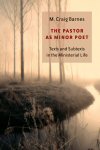
Today’s pastors—often expected to be multitasking marvels who can make their churches “successful”—are understandably confused about their role. Craig Barnes contends that the true calling of a pastor is to help others become fully alive in Christ, to be a “minor poet,” or poet of the soul. As such, pastors are to read the major poets of Scripture and history in light of the dust and grit of daily parish life.
The Pastor as Minor Poet eloquently calls pastors to search for a deeper understanding of what they see—both in the text of Scripture and in the text of their parishioners’ lives. A critical part of this poetic vision involves discerning key subtexts beneath these texts, which allows pastors to preach the heart of the Word and to understand the hearts of their people. Written with a seasoned pastor’s depth of understanding and a poet’s sensibility and sensitivity, this book will minister to and inspire pastors everywhere.
Barnes knows all about being a pastor, how to use authority, how to lead, how to listen, and how to provoke. He knows, moreover, that it finally all comes down to faithful words that can conjure alternative scenarios of the future. In a society cold with technical reason, this summons to poetic truth is of huge importance.
—Walter Brueggemann, William Marcellus McPheeters Professor of Old Testament, Columbia Theological Seminary
M. Craig Barnes is president of Princeton Theological Seminary. Before becoming president of Princeton, Barnes was a chaired professor at Pittsburgh Theological Seminary while also serving as the pastor and head of staff of Shadyside Presbyterian Church. His other books include Searching for Home: Spirituality for Restless Souls and Body and Soul: Reclaiming the Heidelberg Catechism.
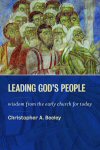
Using the wisdom of the past to address the challenges of the present, Christopher Beeley’s Leading God’s People presents key principles of church leadership as they were taught by great pastor-theologians of the early church, including Gregory of Nazianzus, Ambrose, Augustine, Chrysostom, and Gregory the Great.
In a religious climate where language about leadership is often regarded as basically a matter of secular managerial intrusion into theology, it is wonderful to have a book like this that roots our thinking about the calling of the Christian leader in the wisdom of the early church. This learned, readable, and very timely book deserves a very warm welcome.
—Rowan Williams, archbishop, Canterbury
A foundational and systematic description of the model of leadership in the early Christian community. The author weaves throughout his book excerpts from the epistles of St. Paul and the writings of the church fathers to illustrate that these early theologians understood the essential need for pastoral virtue, humility, holiness, and inspired preaching for effective church leadership. In particular, St. Augustine’s insights are very compelling. Leading God’s People serves as an instructional and meditative companion for clergy members, seminarians, and lay ministers who desire to faithfully exercise their church authority in the most representational manner of Christ’s pastoral shepherding of his flock.
—Daniel Cardinal DiNardo, archbishop, Galveston-Houston
This is a wonderful book, based upon Christopher Beeley’s deep love and knowledge of the great fathers of the church, East and West, as well as the practice of ministry within the church. . . . Provides solid guidance to all who are interested in the practice of Christian leadership, both lay and ordained.
—John Behr, dean and professor of patristics, St. Vladimir’s Seminary
Christopher A. Beeley is the Walter H. Gray Associate Professor of Anglican Studies and Patristics at Yale Divinity School and Berkeley Divinity School at Yale. An Episcopal priest with full-time parish experience, he is also the author of Gregory of Nazianzus on the Trinity and the Knowledge of God, for which he won a John Templeton Award for Theological Promise.

This Odd and Wondrous Calling offers something different from the many books available on ministry. It is a book both honest about the challenges of the vocation and reflective of its joy from two people still pastoring.
Anecdotal and extremely readable, the book covers a diversity of subjects revealing the incredible variety of a pastor’s day. The chapters move from comedy to pathos, story to theology, Scripture to contemporary culture. This Odd and Wondrous Calling is both serious and fun and is ideal for those who are considering the ministry or who want a better understanding of their own minister’s life.
One of the most human and most helpful books on ministry that I know. With moving, often humorous stories Lillian Daniel and Martin Copenhaver open windows onto the major and the mundane in the life of a minister—shaking hands at the door, navigating a clergy marriage, handling money, visiting the hospital. Here is ordained ministry in all its depths, its ordinariness, and its joys.
—Samuel T. Lloyd III, dean, Washington National Cathedral
My dictionary doesn’t have enough enthusiastic adjectives for this book, which I adore . . . Everyone who loves the church or struggles with the church or is just plain curious about the church will relish every page.
—Lauren F. Winner, assistant professor of Christian spirituality, Duke Divinity School
Honest, wise, deeply personal, profoundly theological, and—what’s more—delightfully written.
—Thomas G. Long, Bandy Professor of Preaching, Candler School of Theology, Emory University
This is not another ‘how-to’ book that reduces the mystery of pastoral ministry to simplistic formulas . . . The authors are often brutally honest about the church as well as themselves, but always compelling, and in the end so very hopeful about our calling.
—M. Craig Barnes, president, Princeton Theological Seminary
Here’s a book about ministry from the inside, written by two practitioners of the craft. And not just any two practitioners, but two excellent ministers who are gifted writers. . . . This is the best kind of affirmation of the ministry—an honest one, richly grounded in the reality of the church.
—Anthony B. Robinson, president, Congregational Leadership Northwest
This book gets better the more it is read; it does honor to the church and the ministry . . . We have in it both a classic and a class act.
—Peter J. Gomes, Emeritus Plummer Professor of Christian Morals and Pusey Minister in the Memorial Church, Harvard University
Lillian Daniel is the senior minister of First Congregational Church in Glen Ellyn, Illinois, and a host of the Chicago-based television program 30 Good Minutes. She is also the author of Tell It Like It Is: Reclaiming the Practice of Testimony.
Martin B. Copenhaver is senior pastor of Wellesley Congregational Church in Wellesley, Massachusetts.
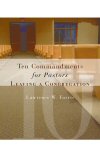
Pastoral transitions can be fraught with pitfalls, yet there is advice that can help ministers and congregations avoid those dangers. Lawrence Farris, a pastor who himself has left three churches, here gives 10 wise, thoughtful commandments for shepherds leaving their flock. Hardly heavy-handed dictums, these “commandments” are more gospel than law, laying out helpful strategies in such areas as recognizing when to depart, patching broken relationships, and enabling the next pastor to make a clean start.
While many may dream of a comfortable, long-term pastorate, today’s congregational realities make the wisdom in this book relevant for pastors in churches big and small, liberal and conservative. Perfect for pastors soon to depart and for those happy to stay put for now, Ten Commandments for Pastors Leaving a Congregation provides welcome guidance to both pastors and parishioners facing this hopeful and challenging transition.
Offers practical wisdom for the leaving process . . . A must read for every pastor.
—Enrichment
Lawrence W. Farris has served churches in Maryland and Michigan, and is currently interim pastor of First Presbyterian Church of Ann Arbor, Michigan.

The opening months of a new pastorate are decisive for how that ministry will unfold, so great care should be taken to begin wisely and well. Simply transplanting programs and habits that worked elsewhere, ignoring the specific dynamics of the new congregation and its people, making too few significant changes, or making too many insignificant changes will create problems for the new pastor that may never be overcome. Ten Commandments for Pastors New to a Congregation offers specific, down-to-earth principles and guidance on how to make a good beginning, one that will lay the foundation for years of fruitful ministry.
Drawing on 25 years of parish ministry, during which he has mentored many new and transitioning pastors, Lawrence Farris here provides 10 guidelines, illustrated with relevant examples that identify potential pitfalls and show how to avoid them. Such areas as preaching, pastoral care, self-care, community and denominational commitments, and role clarity are addressed with an emphasis on practical approaches to ministry in a new setting. Farris also gives clear advice on how to learn the new congregation and its setting, how to set appropriate personal and professional boundaries, and how to stay focused on what matters most in a new ministry.
Lively, practical, and brief enough for the new pastor to have time to actually read it, Ten Commandments for Pastors New to a Congregation is a must-read both for pastors on the move and for individuals preparing for first-time ministry.
Practical and wise. I gladly recommend it to pastors, both new and seasoned, and seminary students as they prepare to enter a first pastoral charge . . . It is full of wise and trustworthy counsel.
—Congregations
A quick read for a population of pastors-in-transition who ought to be craving resources that raise good questions and spark new ideas.
—Princeton Seminary Bulletin
Lawrence W. Farris has served churches in Maryland and Michigan, and is currently interim pastor of First Presbyterian Church of Ann Arbor, Michigan.
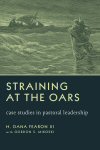
A common complaint of recent seminary graduates is their lack of preparation in practical theology, especially in the tasks of leadership. New pastors encounter a host of challenges that can seem overwhelming.
Biblically oriented, wise, and reassuring, Dana Fearon presents 21 difficult situations that young ministers are likely to face on the job, including prayer in the hospital room, a request to baptize a dead infant, handling conflict and criticism, entering dangerous areas to reconcile hostile groups, and others. As part of his discussion, Fearon presents and reviews his own response to such situations, using his theological education and long experience in church ministry to instruct others.
This book is a treasure, written out of a lifetime of faithful and very effective ministry, full of hard-earned wisdom, grace, and practical insight. I wish I had read this book years ago.
—John Buchanan, former pastor, Fourth Presbyterian Church, Chicago
With a theological depth that could only come from decades of experience, Dana Fearon offers insight and reflection on the expected challenges of ministry and on some that no one could have ever anticipated. Rarely have I come upon a work that so resonates with my life as a pastor. After reading this, pastors will start thinking about even the most mundane realities of pastoral leadership in a freshly theological way.
—David A. Davis, pastor, Nassau Presbyterian Church
Honest, humble, wise, discerning, thoughtful, evocative, accessible. . . . Though written for the recently ordained, these reflections also have much to teach those of us who have been ‘straining at the oars’ for decades as well as the seminarians we supervise, the officers we train, the adults we teach, and the congregations we serve.
—Cynthia A. Jarvis, minister, The Presbyterian Church of Chestnut Hill
Why didn’t the seminary teach us the things we needed to know? Stirred by that enduring question, this gem of a book offers wise and faithful reflections on pastoral leadership and pastoral life. Exploring numerous pastoral situations and challenges, it aptly points to the necessary partnership between seminaries and faith communities for the education and formation of their leaders—a never-ending process.
—Allan Hugh Cole Jr., Nancy Taylor Williamson Distinguished Chair of Pastoral Care, Austin Presbyterian Theological Seminary
H. Dana Fearon III is pastor emeritus of the Presbyterian Church of Lawrenceville, New Jersey, and was a longtime guest lecturer at Princeton Theological Seminary.
Gordon S. Mikoski is associate professor of Christian education at Princeton Theological Seminary and editor of Theology Today.

Through a series of short, thoughtful meditations, Learning to Dream Again shows what true wisdom—wisdom shaped by Jesus’ earthy humility, shameful suffering, and effervescent joy—might look like for Christians today. Through the lens of this Christian wisdom, Samuel Wells addresses a number of difficult personal and social issues, including taxes, abortion, torture, hunger, and Christian engagement with broader culture in the arts, sciences, athletics, and medicine.
As he seeks to present a faithful rendering of the mind of Christ, Wells deftly ties abstract ideas to everyday Christian living. He groups his meditations thematically into these six chapters:
- Learning to Love Again
- Learning to Live Again
- Learning to Think Again
- Learning to Read Again
- Learning to Feel Again
- Learning to Dream Again
Beautifully written and extraordinarily insightful, Learning to Dream Again is both for Christians who have been to church for years but long to ponder the ambiguities and hard questions of faith and life and for new Christians who are just beginning to investigate how the Gospel connects to their most searching questions.
It is impossible to read this commanding book without being put on the spot and recalled to Jesus’ teaching with new authenticity. Sam Wells is a rare preacher and teacher who tugs at the heart as much as he snags at the critical intelligence of the reader who seeks for truth.
—Sarah Coakley, Norris-Hulse Professor in Divinity, Murray Edwards College, University of Cambridge
With self-deprecating humor, Wells disarms us just enough to get us to consider the most counter-cultural matters of faith—like why wisdom is unfashionable, how shame can play a useful role in our lives, and why discipline may do us more good than relentless self-expression. . . . He guides us out of our own egos and into a dazzling divine reality where learning and dreaming meet.
—Lillian Daniel, national speaker and writer
Samuel Wells has written a book so searching, so winsome, so wise that it will find your heart and dwell there. A beautiful piece of work.
—Cornelius Plantinga Jr., senior research fellow, Calvin Institute of Christian Worship, Calvin College
This very wise and moving book about renewal, identity, and the hopeful shape of the Christian life is a rare accomplishment. Wells helps us to think deeply about the ordinary round of life—relationships, marriage, work, leisure, politics, death—while at the same time encouraging us to lift our sights and to dream again, even the dream of God.
—Thomas G. Long, Bandy Professor of Preaching, Candler School of Theology, Emory University
How refreshing! Sam Wells offers intelligent and literary writing on Christian faith that is deeply rooted in Scripture and in his own faith and personal experience. He carries his readers far and wide into matters ranging from the routine challenges of daily life to those as edgy and current as the ‘new atheism’ and the threat of terrorism.
—Michael L. Lindvall, pastor, The Brick Presbyterian Church
Samuel Wells is Vicar of St. Martin-in-the-Fields, London, and visiting professor of Christian ethics at King’s College, London. He was formerly dean of Duke Chapel and research professor of Christian ethics at Duke Divinity School. His previous books include Be Not Afraid: Facing Fear with Faith and Power and Passion: Six Characters in Search of Resurrection.
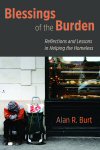
In Blessings of the Burden Alan R. Burt shares his heart for people who are homeless. Full of personal stories drawn from almost two decades of first-hand experience working with the homeless, this book is a passionate plea for greater community involvement in confronting the pressing social problem of homelessness.
Unfolding in five parts, Blessings of the Burden includes Burt’s own journey from apathy to advocacy, a moving interview with a formerly homeless man who is now the director of an organization that fights homelessness in Cape Cod, Burt’s analysis of the fourteen main reasons why homelessness is such a massive problem in America, and an example of how one community developed an innovative and cost-effective approach to helping the homeless among them. Powerful and compelling, Blessings of the Burden will inspire readers to get involved with the homeless and to become advocates for their needs, believing that they can make a difference in their communities.
Blessings of the Burden is a heartfelt reflection on the plight of the homeless in America. In this touching personal account of his own work with homeless people, Alan Burt gives voice to the voiceless among us—people we all too often ignore and neglect. Woven into this compilation of stories is a perceptive analysis of the forces that cause homelessness as well as prayers and lessons about what ordinary people like us can do. May this slim volume find a broad readership.
—Steven Bouma-Prediger, professor of religion, Hope College
Alan Burt’s journey, his message, and his ability to translate conviction into action are an inspiration. He is proof positive that individuals with faith, vision, and commitment can make profound differences in the lives of individuals and communities.
—Dan Wolf, Massachusetts State Senator
The remarkable story of care and advocacy for the homeless on Cape Cod is inextricable from the life and witness of Alan Burt. Readers will be drawn into the sorrows and joys of the real people who are his companions on a shared journey. . . . A model of ministry for other communities.
—Gabriel Fackre, Emeritus Abbot Professor of Christian Theology, Andover Newton Theological School
People of faith who seek solutions to the moral disgrace of homelessness, who want to move from servicing homelessness to solving the problem, will benefit from this story.
—Philip F. Mangano, president and CEO, American Round Table to Abolish Homelessness
Alan R. Burt is a state-licensed social worker who has been advocating for and working with the homeless since 1993 in Cape Cod, Massachusetts.